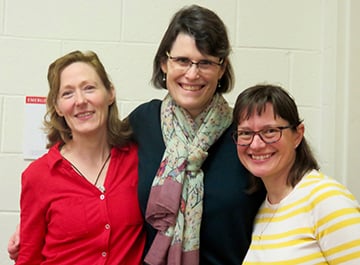Virginia LEND Trainees Advocate for Improved Transition to PostSecondary Education for Students with ASD
April 11, 2017

|
An African proverb states "It takes a village to raise a child." However, it also takes parents with a demonstrated passion and relentless drive to impact the success of their children beyond high school, especially when that child has a disability. Virginia LEND Trainees Kate Flinn and Tammy Clamann, who both have sons in high school who are on the Autism spectrum (ASD), held the first meeting of the Richmond-area Consortium on Level I-II Autism College Student Transition at Virginia Commonwealth University (VCU).
Flinn and Clamann realized early on in their sons' transition process that the parent voice is often not heard or considered by college and university disability services offices when postsecondary education is in the transition plan. Flinn and Clamann believe having a child with ASD poses unique challenges that may require unique solutions. "We [parents] have a genuine worry how the loss of supports, services, and accommodations will affect them once they leave the safety net of the contractual obligations that an Individualized Education Plan (IEP) affords them, as well as caring teachers who often act as their cheerleaders in the school with other teachers and administration," said Clamann. Armed with the knowledge that the parent voice is important even if the student with ASD is beyond the age of majority, the idea came to create a practical way to address their concerns, bring added awareness, and draw assistance from various groups and organizations focusing on postsecondary education transition. Through the helpful leadership of their advisor and Va-LEND faculty member Dr. Christine Eubanks, also the parent of a college student with ASD, Flinn and Clamann successfully carved out a strategy, which resulted in this consortium.
Representatives from community service providers as well as local public and private colleges and universities were among the invited guests. Parents, teachers, and college students also took part in the event. Clamann said there is a key and critical component of the transition bridge missing, between the support students in the Richmond area receive in their high school program compared to other supported environments. "The desired outcome for having such an event was to create an effective and successful transition and support structure for Level I-II Autism students that would assist them to not only find the school/career path that's right for them (and not one chosen for them or has limited options), but to also offer real academic, functional, and social supports these students require to achieve a successful college education and experience. These supports MUST include ongoing career support that will enable them to be on a successful career and life path," she said.
Flinn and Clamann fielded questions throughout their presentation and explained the specific challenges identified at each level on the Autism spectrum. After the presentation, attendees participated in a lively discussion and shared their challenges and concerns about students with all types of disabilities achieving success in college and in life. More Consortium meetings are being planned.







